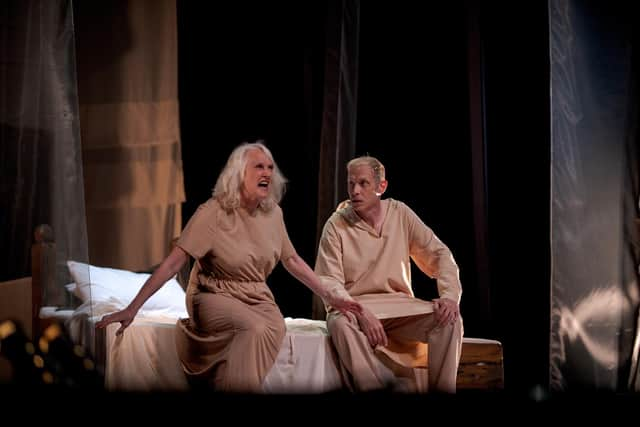Theatre review: Thora, Orkney Theatre, Kirkwall Grammar School
Thora, Orkney Theatre, Kirkwall, Grammar School ****
In the beautiful Pier Arts Centre in Stromness, I find myself gazing for a long time at a beautiful Barbara Hepworth sculpture called Two Heads (Mother And Child). Despite her struggles to balance the demands of motherhood and art, Hepworth fully understood the intensity of the mother-child bond; so the sculpture – one of several small Hepworth pieces in the exquisite Margaret Gardiner collection at the Pier – seems to demand attention, on the day before I head to Kirkwall to see David McNeish’s play Thora, about the life of the high-born Norwegian woman who, in 1080, became the mother of Orkney’s patron saint, Magnus.
People who visit Orkney often hope to find peace. They are often surprised, though, to find not only peace, but something that goes beyond that – a commitment to peace, perhaps, or a place with a special relationship to the idea of peace; and that feeling has much to do with the legend of Magnus, Earl of Orkney, a man of peace who met his death, around 1117-18, after his warlike cousin Haakon reneged on a peace deal, and had him slaughtered on the shore of Egilsay island at what was supposed to be a peaceful meeting.
Advertisement
Hide Ad

In McNeish’s play, we therefore meet his mother Thora towards the end of her life, still brooding on what she might or might not have done to save her son, and we see Magnus return to her deathbed in spirit, to hear the story of his birth – following his father Erlend’s brutal public rape of his new young bride, staged to satisfy the bloodlust of his troops – and of Thora’s successful struggle, after Magnus’s death, to ensure he was commemorated as a hero, a martyr, and eventually a saint.
In a production powerfully directed by Gerda Stevenson for this year’s St Magnus Festival, and beautifully designed by Jessica Brettle to show Thora’s bed, a huge swathe of white sheeting, and a bed-head that echoes the entrance to Orkney’s ancient burial and birthing place Maeshowe, all perfectly lit by Laura Hawkins.
McNeish’s 60-minute dialogue between Thora and her lost son is powerfully played out by Simon Donaldson as Magnus, and a splendidly defiant Isabella Jarrett as the aged Thora. Eleanor Dean is also present in the silent role of young Thora, a figure full of youthful joy, and then in deep pain, as she introduces the dark swathes of red material that reflect the violence of Magnus’s conception and birth, and, by extension, all the terrible brutalisation of women that went unrecognised and unspoken in a time when the war wounds of men were celebrated, but those suffered by women were seen as a matter of shame, not for those who inflicted them, but for the women themselves.
For McNeish, a Church of Scotland minister who moved to Orkney in 2015 after a previous career in medicine, this is his first performed play, and one for which he has had to imagine most of the detail. The recording of women’s lives in the 12th century was so scanty that all that is known of Thora is that she was married to Erlend, gave birth to Magnus and three other children, and petitioned for Magnus’s proper burial after his death.
The story McNeish has made of this material is all too credible, though, and despite its sometimes harrowing content, the spirit of his play, captured by this fine company, is as defiant as that of his imagined Thora herself – sometimes baffled by Magnus’s staunch refusal to conform to the warlike masculine culture of his times, and often afraid for him, but finally able to recognise his world-changing heroism when she sees it, and to sail onward towards the unknown, in love and strength.
Run completed. The St Magnus Festival continues until 23 June.